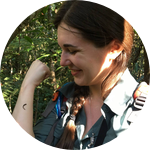About This Project
The goal of this research is to identify parasitic infections in marine mammals like seals, whales, and dolphins. We hope to aid in diagnosis and treatment of these infections using DNA sequences. Molecular biological techniques will allow us to monitor these infections.Ask the Scientists
Join The DiscussionWhat is the context of this research?
Marine mammal parasitology is a relatively understudied subject. Very little is known about the nematode parasites that infect these organisms, save those parasites that have a direct impact on human health. Thus, developing an understanding of the basic biology and behavior of these parasites is of great importance.
Controlling parasitic infections, especially those of endangered species, is of utmost importance for conservation. Currently, very little molecular sequence data exists for these organisms.
This work focuses on generating molecular data on several morphologically identified parasites as well as constructing nematode phylogenies and assessing coevolution as a means to identifying risky infections.
What is the significance of this project?
Parasitic infections can be catastrophic to marine mammal population recovery and survival. This is best illustrated by the example of the kidney parasite Crassicauda boopis. C. boopis blocks the renal arteries leading to kidney failure and death. This infection is predominant in juvenile humpback, finback, and blue whales, which are generally slow to breed and recovery from population crises.
Based on previous analysis C. boopis appears to be a risky infections, capable of infecting other large, endangered baleen whales. Controlling the spread of this infection is quintessential in conserving this amazing marine mammals.
Simple research into the basic genetics and biology of the parasites is the first step in understanding and controlling these infections.
What are the goals of the project?
This funding will allow me to extensively sequence over 2000 parasite samples as well as create simple, fast PCR (polymerase chain reaction) assays for species identification and diagnostics.
Further, this research will allow me to purchase reagents and kits I desperately need to continue research into sequencing mitochondrial genomes, which hold the key to diagnostic development.
Additionally, funding will allow me to report back to the aquariums from which the parasites came and allow them to monitor infection in stranded animals much more closely and accurately.
Lastly, this funding will allow me to expand into next generation sequencing, greatly helping my attempt to sequence and annotate mitochondrial genomes
Budget
- I want to push my project towards next generation sequencing (Illumina Miseq (C) ) which is extremely expensive but extremely useful! I cannot continue towards sequencing mitochondrial genomes without more funding
- I'd like to collect more samples, but cannot continue to pay for the travel expenses alone.
Meet the Team
Affiliates
Team Bio
I am a Master of Science student as Smith College, having previously graduated from Smith with a B.A. in Biology (cum laude and with highest honors) and Chemistry. My current focus is molecular biology, and I am currently in the Williams lab.My current research focuses on investigating the biology and evolution of marine mammal parasites. The primary goal of this project is to increase the amount of sequence data available in public databases such as NCBI GenBank to aid in species identification to facilitate diagnostics and species identification.
I entered this field after working as a summer student at Woods Hole Oceanographic Institute the summer of 2012. While at WHOI, I noticed that every animal was full of parasites. I forged a partnership between Smith and WHOI so I could analyze these worms. I have recently forged additional relationships with the Mystic Aquarium, NOAA and the North East Fisheries Science Center, The New England Aquarium and the Pacific Marine Mammal Center.
Caroline Keroack
I am currently a MSc candidate in the Williams laboratory at Smith College, focusing on surveying the biodiversity of marine mammal parasitic infections and using evolutionary and molecular information to generate important diagnostic tools for these infections. I have a strong passion for infectious disease and have worked on a variety of projects including those focusing on lymphatic filariasis. Although my current focus is mainly on veterinary pathogens (specifically parasites of marine mammals), I am able to bring a unique perspective to many problems in infectious disease. I am very interested in expanding my research to understand zoonotic events.
Additional Information
By helping me, you can help seals, whales, and dolphins be properly treated for parasitic infections. This is Townshend the seal, who was treated at one of the facilities that provides me with parasite samples.
(Image source for wall paper: http://photography.nationalgeographic.com/wallpape...)
Project Backers
- 35Backers
- 106%Funded
- $2,240Total Donations
- $64.00Average Donation



